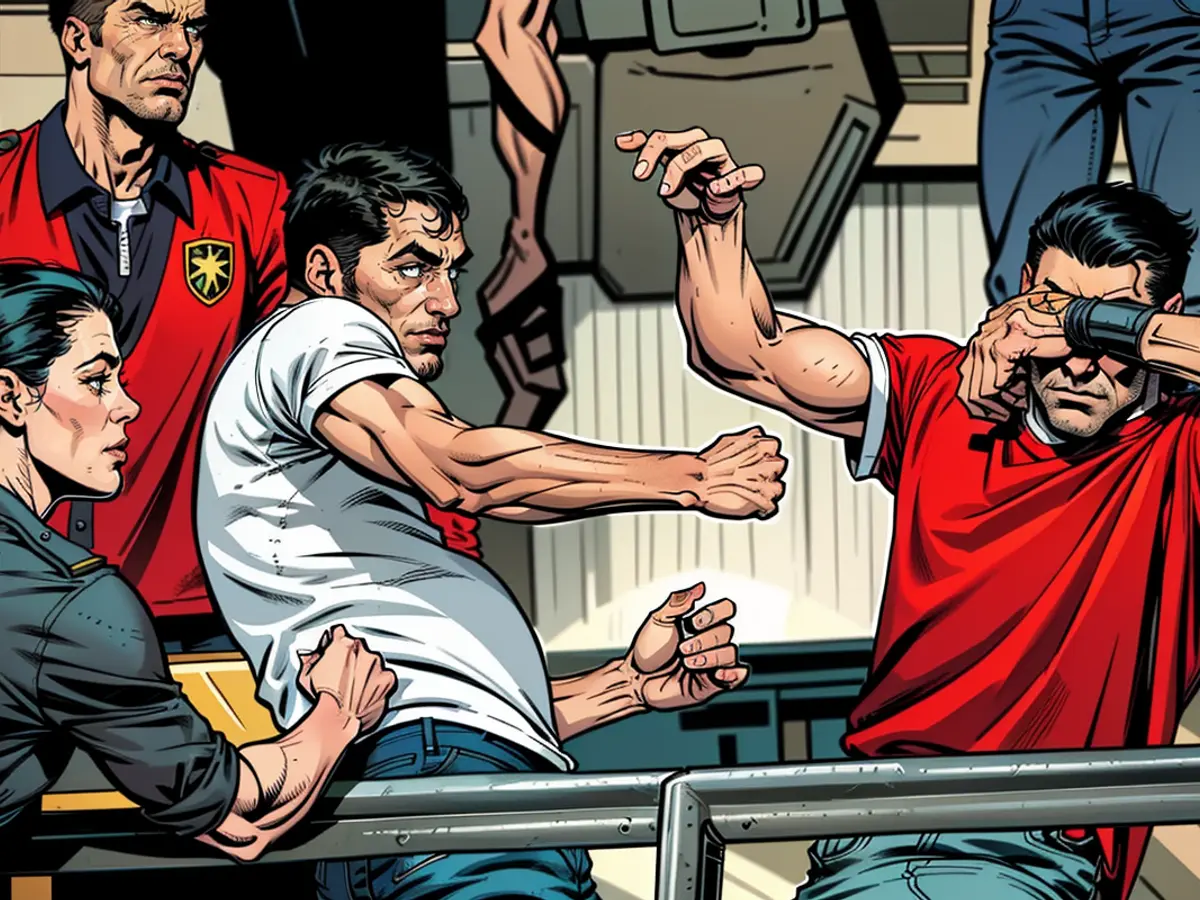Hooligan incursion: Gelsenkirchen confronts a challenging commencement in the Euro Cup
This coming Sunday, the European Football Championship will kick off its first high-stakes game: The match between Serbia and England in Gelsenkirchen is anticipated to have a heightened risk of fan violence. A concern: The domain of aggressive supporters has undergone considerable modifications.
German Federal Interior Minister Nancy Faeser is confident: "The police forces of the federal and state governments face an immense challenge with the EM," she said before the tournament commenced. "The Federal Police is preparing for the largest deployment in its history." Already during the first EM weekend, the security forces encountered a challenge unlike those caused by the Ukraine war or possible cyber attacks: the fear of hooligan riots.
The opening EM match is the game between Serbia and England on Sunday evening in Gelsenkirchen (9 pm/ZDF and MagentaTV, as well as in the liveticker at ntv.de). An estimated 40,000 English fans, 8,000 Serbians - and the primary issue: Around 500 known Serbian hooligans are expected in the city.
Low-Alcohol Light Beer Only
Due to safety reasons, more police officers will be active than in a local derby between Schalke 04 and Borussia Dortmund, as confirmed by Gelsenkirchen's Leading Police Director Peter Both. "I can't give you the exact number of deployed officers from a tactical standpoint." Inside the stadium, Both anticipates around 20,000 Englishmen and about 10,000 Serbians. The police estimate that 15,000 Englishmen without a ticket will flock to the racecourse for the public viewing. For the Serbians, a precise figure is unavailable. During this game, only the sale of a light beer variety with half the alcohol content is allowed: 2.5% instead of 4.8%, to minimize the potential for escalation as much as possible.
However, what was circulated via numerous European media as the central aspect of the hooligan issue is, according to experts, no longer the core issue. The hooligans who go to the stadium, down a few beers, and then indiscriminately engage in brawls - this is generally a cliché among hooligans from Eastern Europe and the Balkans. "The hooligan scene has professionalized itself and its violence over the past few years," said fan researcher and hooligan expert Robert Claus to "Focus".
The specialist views nations like Serbia, Croatia, Hungary, or Poland as primarily displaying two trends: an overlap of hooliganism with far-right structures. And rigorous organization. "There are hardly any hooligans left who don't practice martial arts," said Claus. "From the scene emerged private fitness studios, martial arts events, and advertising companies, and thus jobs."
Hooligans Highly Networked
Hooligans are highly networked - within their respective national borders and beyond. During the mass brawls surrounding the Final Tournament of the Basketball EuroLeague at the end of May last year in Berlin, fans of Red Star Belgrade and Olympiakos Piraeus joined forces to assault the fans of Panathinaikos Athens.
The Serbians didn't even participate in this tournament. However, fan groups of Red Star maintain their connections, also to far-right structures, organized crime, and, above all, to pro-Russian groups. This encompasses the circles of the violent incidents at the European Championship 2016 in France, the final EM tournament before the coronavirus pandemic. Nearly 200 well-organized Russian hooligans attacked thousands of English fans in Marseille.
Foreign Police Officers at the EM Deployment
The police are also preparing for the deployment of foreign police officers at the EM. The Federal Police, the State Police, and the European Union Agency for Police Cooperation (Europol) are involved in the planning. The Federal Ministry of the Interior has announced that approximately 100 foreign police officers will be deployed at the EM. "The aim is to ensure the greatest possible security for all participants and to prevent any incidents," said a ministry spokesperson. The foreign police officers will be stationed at airports and train stations, as well as at stadiums and fan zones. They will support the German police forces in identifying and preventing potential security risks. The foreign officers come from countries such as England, France, and the Netherlands.
To prevent such situations in German EM cities, the security forces are collaborating closely with foreign police officers during the EM. Five hundred and eighty of them will be on duty in Germany during the EM. Serbian or Polish police identify Serbian or Polish hooligans - that's the strategy.
"The international police forces are a link between our police and the fans and guests from the participating countries," said Interior Minister Faeser (SPD) on Thursday at their welcome in Bamberg. "The presence of uniformed police officers from their own homeland can deter potential violent offenders. We can take targeted action and thwart violence together."
To prevent violent fans during the European Championship, enhanced border controls will be conducted in several federal states. In Mecklenburg-Vorpommern, for instance, the Federal Police have increased checks at Poland's border crossings and ferry terminals to Denmark and Sweden, working closely with their Polish partners. "We share international data about hooligans," said Bavaria's Interior Minister Joachim Herrmann (CSU) on Friday during the ZDF's "Morgenmagazin." "We'll maintain these stringent border controls. It's crucial and appropriate."
Read also:
Despite the low-alcohol beer only policy in place, the fear of hooligan riots remains a significant concern for the authorities in Gelsenkirchen, with around 500 known Serbian hooligans expected to attend the European Championship opening match between Serbia and England. Despite efforts by the police to collaborate with foreign forces and conduct enhanced border controls, the potential for violence remains high due to the organized and networked nature of the hooligan scene.
In response to the hooligan invasion, German Federal Interior Minister Nancy Faeser stated that the police forces face an immense challenge during the European Championship and are prepared for the largest deployment in the history of the Federal Police. This includes the deployment of foreign police officers from countries such as England, France, and the Netherlands, who will support German police forces in identifying and preventing potential security risks.








